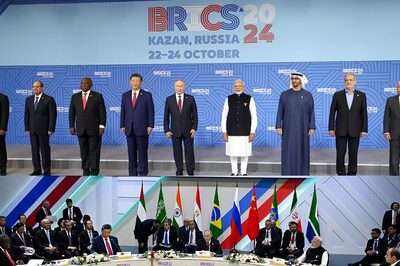
views
A 1950s cult classic, which is a commentary on the contradictory narratives and interpretations of an event, and a constitutional and political crisis which has been averted in Maharashtra, may have little in common.
But, for players in the thick of things, there seems to be a ‘Rashomon effect’ at work, with them interpreting the same set of events in a different manner like Akira Kurosawa’s film.
On Thursday, after much back-and-forth over previous recommendations by the Maharashtra cabinet, governor Bhagat Singh Koshyari, requested the Election Commission of India (ECI) to hold polls to nine seats in the state legislative council.
On Friday, the ECI announced that elections would be held on May 21. Thus, chief minister and Shiv Sena president Uddhav Thackeray will be able to contest polls to the upper house, averting the constitutional crisis looming large on his three-party alliance government.
Uddhav, who became the first from the Thackeray clan to be elected to a constitutional position, when he was sworn in as the chief minister of Maharashtra on November 28, is not a member of the legislature. Hence, he has to be elected to either house by May 27, failing which he will have to resign.
By implication, the chief minister’s resignation leads to the entire council of ministers stepping down.
Though Uddhav was expected to contest the elections for one of the nine seats which were due in April, the coronavirus epidemic led to the polls being postponed. With a crisis looming large, the state cabinet on April 9 recommended that Uddhav be nominated to the upper house from one of the two vacant seats in the governor’s quota. After Koshyari did not act on this, the recommendation was repeated by the cabinet this week, but in vain.
However, things seemed to have moved after Uddhav spoke to Prime Minister Narendra Modi on Wednesday, and group leaders of the Shiv Sena, Nationalist Congress Party (NCP) and Congress, wrote to the ECI a day later, seeking that council polls be held at the earliest.
Some interpretations of the crisis and its de-escalation, after tense moments for the ruling ‘Maha Vikas Aghadi,’ hinge on the allegation that this is a manifestation of the BJP’s “withdrawal symptoms after being deprived of power” in Maharashtra.
Others claim it is an attempt to vitiate the state’s political culture or needle the Shiv Sena unnecessarily. Many also call it the BJP’s zero-sum game, with a perception being created that the party is playing vendetta politics at a time when the Uddhav Thackeray-led regime is in the thick of a daunting battle against the coronavirus.
But there seems to be near unanimity about a message of the ruling dispensation standing on wobbly legs being sent to the disparate stakeholders who are part of the ‘Maha Vikas Aghadi’ government.
A Shiv Sena minister claimed that the breakthrough may have come after a realisation that in case Uddhav was compelled to resign, he would walk away with a chunk of the sympathy vote. Uddhav is also seen as carving a niche for himself and his party through his addresses to the people of Maharashtra during the lockdown, which have made for good optics so far.
The minister charged that this initial dithering could have been part of a larger ploy to show that the dispensation could be destabilised at will, and indicate to fence-sitting legislators that the threat of President’s rule was looming large in case of political instability.
Though the Shiv Sena alleges that political considerations played a role in the governor’s refusal to heed the cabinet’s recommendation to nominate Uddhav, this is denied by BJP leaders. Leader of Opposition and former chief minister Devendra Fadnavis had welcomed the governor’s decision to make a recommendation to the ECI.
Fadnavis had tweeted that this would prevent Maharashtra from entering a period of instability, while also “upholding the values of the Constitution”.
BJP leaders also strongly decry attempts by Shiv Sena and Congress leaders to drag a constitutional position (that of the governor) into the rough-and-tumble of politics by attributing motives to a decision that has obvious legal implications.
A senior BJP leader denied there were any political considerations in the governor’s previous refusal to heed the state cabinet’s recommendation to nominate Uddhav to the council. The governor’s quota is meant for distinguished personalities with special knowledge in sectors like art, literature, science and social service. The BJP leader said those nominated to the council from this category were expected to serve in an “advisory” rather than a ‘decision-making” role.
Moreover, no chief minister of Maharashtra had been nominated to the legislature through such a backdoor route. Though some CMs like the late Abdul Rehman Antulay and Prithviraj Chavan had not been members of either house before their appointment, they were elected to the assembly or council later, and not nominated through the governor’s quota.
The BJP leader claimed that the government had lost the opportunity to get Uddhav elected to the council during the Yavatmal-Washim bypolls earlier this year. The Shiv Sena’s Dushyant Chaturvedi was elected to the seat, which had been vacated by the party’s Tanaji Sawant, who was elected to the assembly.
The Representation of the People Act, 1951, lays down that the election or nomination to a post cannot be done if the remainder of the term of a member in relation to a vacancy is less than one year. The terms of the two vacant seats in the council end on June 6, which may have led the governor refusing to act on the cabinet’s recommendation, he pointed out.
He alleged that finger-pointing by the three parties in the government towards the BJP and the governor, was meant to paper over the chinks in the coalition over lack of consensus in decision making. Moreover, there was a chance that if Uddhav was forced to resign and take oath again, the Congress, which is now seen as an unwilling partner in the coalition, may either walk out or set difficult terms for the Shiv Sena to comply with.
This could include positions on contentious issues on which the two parties do not see eye-to-eye like the 5% religion-based quotas for the Muslim community in Maharashtra, contentious legislation like the Citizenship Amendment Act, and Hindutva ideologue Vinayak Damodar Savarkar. This could help the Congress consolidate its target constituency, while the Shiv Sena would be caught in a tight spot.
It is claimed that a section of the Congress, including a faction close to former party president Rahul Gandhi, is said to be uneasy at the move to share power with a “communal” party like the Shiv Sena. Some leaders claim to feel slighted in the larger scheme of things in the government.
A Congress leader admitted that the hectic back-and-forth behind the scenes, which led to the de-escalation of the situation, had underlined the vulnerabilities of the government. He said that the dispensation seems to have sailed through for now, with uncertainty about what lies in the future’s vast unknown.
(Dhaval Kulkarni is a Mumbai-based journalist and author of ‘The Cousins Thackeray: Uddhav, Raj and the Shadow of their Senas’. Views are personal).




















Comments
0 comment